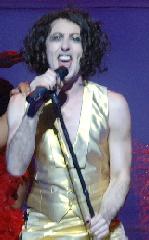SITE GUIDE
SEARCH
REVIEWS
FEATURES
NEWS
Etcetera and
Short Term Listings
LISTINGS
Broadway
Off-Broadway
NYC Restaurants
BOOKS and CDs
OTHER PLACES
Berkshires
London
California
New Jersey
DC
Philadelphia
Elsewhere
QUOTES
TKTS
PLAYWRIGHTS' ALBUMS
LETTERS TO EDITOR
FILM
LINKS
MISCELLANEOUS
Free Updates
Masthead
Writing for Us
A CurtainUp  London Review
London Review
 London Review
London ReviewBacchae
|
You will worship me for what I am because I am Dionysus. I am the Scream— Dionysus
|

Alan Cumming as Dionysus
(Photo: Richard Campbell) |
One of the most commonly produced Greek tragedies in the modern theatre, The Bacchae has never yet enjoyed a revival so full of panache, comedy and sheer energy as this. The National Theatre of Scotland’s production was first aired at the Edinburgh Festival this year and now at the Lyric Hammersmith, it is like the procession of Bacchants in the play, making its loud, exuberant way onwards to bring the cult of Dionysus to the uninitiated.
The play is set in Thebes, where the new god Dionysus returns to assert his divinity and demand worship. In disguise as an Oriental priest of his own cult and accompanied by a chorus of loyal Bacchants, he confronts his mother’s family who rule the city and who scorned her claims to be pregnant by Zeus. It soon becomes clear that Dionysus desires no happy family reunion but intends to exact his due of recognition pitilessly.
This production does not attempt to tailor the play to any specific modern parallel, instead recognising that its timeless themes can transcend individual situations but still be relevant to today’s society. David Greig’s translation is both unaffected and robust, and it feels as if he knows the play very well. Unafraid to tweak Euripides’ words where necessary, Greig still defers to the overall spirit of the play. This is a thinking man’s translation which works well onstage with combination of wordsmith’s originality and speakability.
The part of Dionysus is in many ways the crux of the play and Alan Cumming portrays this character as mercilessly egoistic and unashamedly self-glorifying. He is more a rock god rather than an Olympian, whose thyrsus is a microphone. Dressed in a gold lamé kilt and waistcoat, with black curly wig, heavy eye makeup and dark lipstick, he is sexually both ambiguous and extrovert. Intensely charismatic, his impish grin evokes the permanently smiling mask of the fifth century BCE staging, as well as hinting at an underlying elusiveness. In fact, Alan Cumming thoroughly justifies the amount of hype surrounding his performance.
He does, admittedly, have sterling support from the rest of the cast: Tony Curran as the dour, uptight Pentheus, Paola Dionisetti as Agave whose bacchic ecstasy turns to catastrophe and Ewan Hopper as the reasonable, although doomed, Cadmus.
Moreover, the chorus, with great choreography and gospel-strength voices, are fantastic. The choral odes of Attic tragedy are notoriously unwieldy on the modern stage: often unallied to the plot and full of esoteric references to ancient myths, genealogies or locations. However, I have never seen them translated onto the modern stage so successfully. As the songs are an integral part of the production, it feels more like a musical tragedy than a straight play.
The denouement of this play contains one of the most shocking twists in the history of theatre. By the end of The Bacchae, Dionysus is revealed to be not human at all but a terrifying supernatural force with unimagined powers of devastation. The audience realise that they have been tricked into thinking of him and feeling for him as a person, when in fact such sympathy for him is not only redundant but also entirely inappropriate. This shift is always difficult to manage well on stage, but this production does well, as Dionysus, larger-than-life throughout, fulfils the promise of his own hyperbolical nature.
At times, this production is outrageous, but entirely fittingly so as Euripides himself was a dedicated courter of controversy. Audiences primed to see a Greek Tragedy may be surprised at the amount of humour in this production, but no one can deny that Euripides flirted with Aristophanic comedy in this play especially. This production is funny, brash and remarkably true to the tenor of the original.
|
THE BACCHAE
Written by Euripides In a new version by David Greig Directed by John Tiffany A National Theatre of Scotland and Edinburgh International Festival co-production in association with Lyric Hammersmith. Starring: Alan Cumming With: Tony Curran, Ewan Hooper, Ralph Riach, Paola Dionisetti, Michelle Asante, Mynette Clarke Sharon Duncan-Brewster, Marcia Mantack, Gloria Onitiri, Denise Orita, Ann-Marie Roberts, Jessika Williams, Emi Wokoma, Sandra Yaw Associate Director and Choreographer: Steven Hoggett Designer: Miriam Buether Lighting Designer: Colin Grenfell Composer and Musical Supervisor: Tim Sutton Sound Designer: Christopher Shutt Running time: One hour 50 minutes with no interval Box Office: 0870 050 0511 Booking to 22nd September 2007 Reviewed by Charlotte Loveridge based on 7th September 2007 performance at Lyric Hammersmith, King Street, W6 0QL (Tube: Hammersmith) |
|
London Theatre Tickets Lion King Tickets Billy Elliot Tickets Mary Poppins Tickets Mamma Mia Tickets We Will Rock You Tickets Theatre Tickets |




